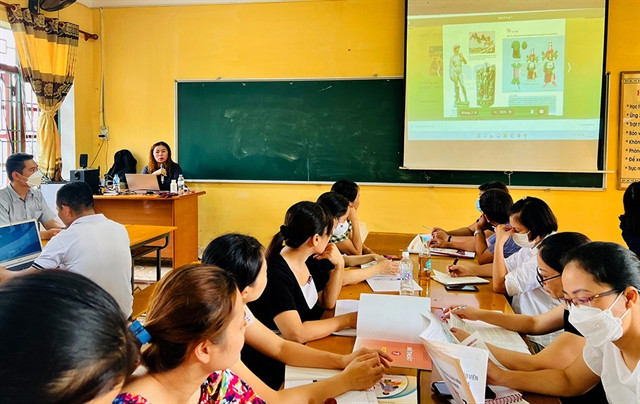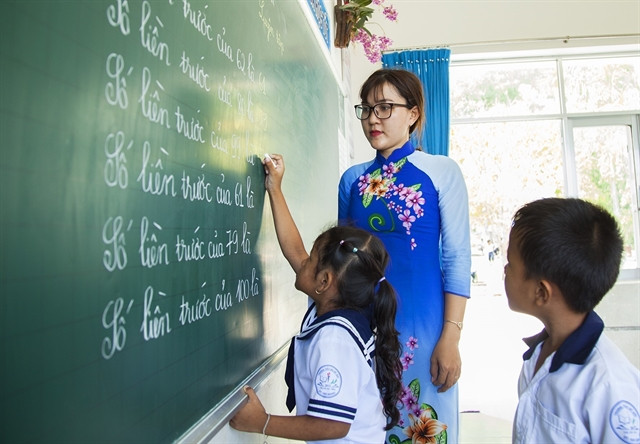 |
| Training officials and teachers in Bắc Giang Province on the effective use of 7th and 10th-grade textbooks for the academic year 2022-2023. VNA/VNS Photo |
Despite the introduction of a training mechanism for the Government to support pedagogical students through training task assignment, ordering, or bidding, many localities have expressed dissatisfaction with its implementation since its application in 2021 enrollment.
As per the provisions of Government Decree 116/2020, which focuses on supporting tuition fees and living expenses for pedagogical students, the Provincial People's Committees are responsible for reviewing, calculating, and determining the recruitment and training requirements for teachers at various levels for the enrollment year.
Based on the identified need to recruit teachers, taking into account their qualifications, the local training industry, social demands, quality assurance criteria, and the training capacity of teacher training institutions, the ministry determines and informs the training institutions about the enrollment targets they are expected to achieve.
However, a limited number of localities responded to the supporting mechanism, while most showed little interest in utilising it. Out of 30,807 pedagogical students eligible for support under Decree 116, only 24.3 per cent were assigned tasks by the local authority, accounting for just 17.4 per cent of the total enrollment.
 |
| A teacher with students at Mỹ Đức Primary School in Hà Tiên City, Kiên Giang Province. VNA/VNS Photo |
The leader of Hồ Chí Minh City University of Education clarified that the institution recruited and trained pedagogical majors according to the targets set by the Ministry of Education and Training, taking into account the projected demand from various localities. Following student enrollment, the university proactively reached out to the provinces to inquire about their requirements for teacher training under Decree 116. However, the response from localities had been minimal, indicating a limited interest in the supporting mechanism.
In 2021, the teacher training provision was applied for only two provinces, namely Long An and Ninh Thuận. In 2022, only Long An Province placed an order for a school to train 27 teachers.
During the 2021 enrollment course at Saigon University, only two provinces, Long An and Ninh Thuận, availed themselves of the opportunity to place orders for the training of 34 pedagogical students.
However, in 2022, despite the university's concerted efforts to engage all provinces with students pursuing pedagogy, only a limited number of localities responded. Surprisingly, some of these responding localities expressed that they did not have a need to order teacher training.
Nguyễn Hứa Duy Khang, deputy head of Cần Thơ University's training department, explained that the school's pedagogical enrollment quota is assigned by the Ministry of Education and Training based on localities’ needs. In 2021, the school received orders to train teachers for two provinces, Long An and Vĩnh Long.
Out of the ordered 159 students in Long An Province, only 11 with household registration in the locality were eventually signed into contracts to receive support, excluding students with household registration in other provinces.
As for Vĩnh Long province, they ordered 240, and 203 students registered for the training. However, in the end, Vĩnh Long Province did not sign any contract with any students for the teacher training programme.
In 2022, the leader of Vĩnh Long Department of Education and Training explained the reasons for not ordering teacher training, stating that funding constraints and other difficulties in implementing Decree 116 hindered the province from placing orders for pedagogical students in the 2021 enrollment course with Cần Thơ University.
Leaders of various provinces and cities expressed that although there is a significant demand for teachers at the local level, the number of job positions assigned to each province remains low, leading to various challenges.
Prior to the implementation of Decree 116, localities assessed the actual use of human resources in the education sector. But an issue arose with the increasing size of schools each year while the Ministry of Home Affairs continued to cut staff annually. Meanwhile, the guidelines for bidding work in the implementation of Decree 116, as provided by the Ministry of Education and Training, lack clarity.
According to a leader of a local training department, the ordering and bidding mechanism, which involves multiple stakeholders, has been perceived as overly complex, posing challenges for localities in adhering to the correct timelines, processes, and procedures. Additionally, recovering training funding from learners becomes problematic, particularly when the task of dealing with violations is assigned to the locality without clear guidance on sanctions to ensure effective recovery.
Additionally, it was noted that students who undergo training through bidding or ordering methods will be financially supported by the State. However, this does not guarantee their employment as teachers after graduation, as they are still required to pass the official recruitment exam to become teachers, adding to the uncertainty for both students and local authorities.
Another difficulty in implementing the order for teacher training is that even if students do not return to work locally, once the order has been placed, the province that ordered their training still has to bear the cost of their training. Consequently, local orders may be perceived as less attractive and this may contribute to the limited response and interest in the teacher training mechanism.
Solutions
In the report to the Prime Minister in February 2023, the Ministry of Education and Training acknowledged the challenges in implementing Decree 116, attributing the difficulties to the complexity arising from various stakeholders involved. These include the need for teachers proposed by localities, ministries, and sectors based on practical models, payroll quotas assigned and allocated by the Department of Home Affairs, training enrollment quotas determined by the Ministry of Education and Training, and funding from the Ministry of Finance.
Đỗ Văn Dũng, former rector of Hồ Chí Minh City University of Technology and Education, highlighted the overlapping responsibilities between the Department of Home Affairs, which is responsible for recruiting officials and the Department of Education and Training, which is in charge of employing teachers.
“The process of ordering teacher training requires close coordination between the Ministry of Education and Training, localities, and universities,” he said.
“Every year, localities must report their demand for the number of teachers to be recruited to the Ministry of Education and Training for consideration in allocating quotas and placing direct orders to training institutions. After graduation, students can register their work preferences in different localities, and the Ministry of Education and Training will review and assign them to provinces with needs,” he suggested.
Source: VNS